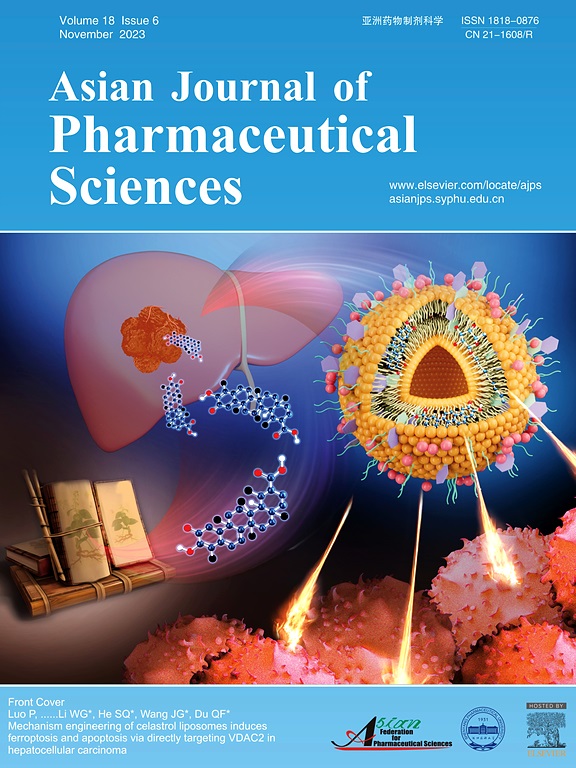Codelivery of apigenin, FdUMP and CD276 antibody synergistic inhibit colorectal cancer by ferroptosis-apoptosis-pyroptosis and CD276 blockade
IF 11.9
1区 医学
Q1 PHARMACOLOGY & PHARMACY
引用次数: 0
Abstract
Mitochondria provides adenosine triphosphate for multiple vital movements to ensure tumor cell proliferation. Compared to the broadly used method of inducing DNA replication arrest to kill cancer, inducing mitochondria damage to cause energy shortage is quite promising as it can inhibit tumor cell bioactivities, increase intracellular accumulation of toxic drugs, eventually sensitize chemotherapy and even reverse drug resistance. Breaking the balance of glutathione (GSH) and reactive oxygen species (ROS) contents have been proven efficient in destroying mitochondria respectively. Herein, apigenin, a GSH efflux reagent, and 2′-deoxy-5-fluorouridine 5′-monophosphate sodium salt (FdUMP) that could induce toxic ROS were co-delivered by constructed lipid nanoparticles, noted as Lip@AF. An immune-checkpoint inhibition reagent CD276 antibody was modified onto the surface of Lip@AF with high reaction specificity (noted as αCD276-Lip@AF) to enhance the recognition of immune cells to tumor. Results showed that the redox balance was destroyed, leading to severe injury to mitochondria and cell membrane. Furthermore, synergistic DNA/RNA replication inhibition caused by inhibiting the function of thymidylate synthase were observed. Eventually, significantly enhanced cytotoxicity was achieved by combining multiple mechanisms including ferroptosis, apoptosis and pyroptosis. In vivo, strengthen tumor growth inhibition was achieved by αCD276-Lip@AF with high biosafety, providing new sights in enhancing chemotherapy sensitiveness and achieving high-performance chemo-immunotherapy.
芹菜素、FdUMP和CD276抗体共递送通过铁凋亡-凋亡-焦亡和CD276阻断协同抑制结直肠癌
线粒体为多种重要运动提供三磷酸腺苷,确保肿瘤细胞增殖。与目前广泛使用的通过诱导DNA复制停止来杀死癌症的方法相比,诱导线粒体损伤导致能量短缺的方法很有前景,因为它可以抑制肿瘤细胞的生物活性,增加细胞内有毒药物的积累,最终使化疗变得敏感,甚至逆转耐药。打破谷胱甘肽(GSH)和活性氧(ROS)含量的平衡分别被证明是破坏线粒体的有效方法。在这里,芹菜素,一种谷胱甘肽外排试剂,和2 ' -脱氧-5-氟吡啶5 ' -单磷酸钠盐(FdUMP),可以诱导毒性ROS通过构建的脂质纳米颗粒(Lip@AF)共同递送。将免疫检查点抑制试剂CD276抗体修饰在Lip@AF表面,具有高反应特异性(标记为αCD276-Lip@AF),增强免疫细胞对肿瘤的识别。结果表明,氧化还原平衡被破坏,线粒体和细胞膜受到严重损伤。此外,还观察到抑制胸腺苷酸合酶功能对DNA/RNA复制的协同抑制作用。最终,通过铁凋亡、细胞凋亡和焦亡等多种机制,显著增强细胞毒性。在体内,αCD276-Lip@AF具有较高的生物安全性,可增强肿瘤生长抑制,为提高化疗敏感性和实现高效化疗免疫治疗提供了新的视角。
本文章由计算机程序翻译,如有差异,请以英文原文为准。
求助全文
约1分钟内获得全文
求助全文
来源期刊

Asian Journal of Pharmaceutical Sciences
Pharmacology, Toxicology and Pharmaceutics-Pharmaceutical Science
CiteScore
18.30
自引率
2.90%
发文量
11
审稿时长
14 days
期刊介绍:
The Asian Journal of Pharmaceutical Sciences (AJPS) serves as the official journal of the Asian Federation for Pharmaceutical Sciences (AFPS). Recognized by the Science Citation Index Expanded (SCIE), AJPS offers a platform for the reporting of advancements, production methodologies, technologies, initiatives, and the practical application of scientific knowledge in the field of pharmaceutics. The journal covers a wide range of topics including but not limited to controlled drug release systems, drug targeting, physical pharmacy, pharmacodynamics, pharmacokinetics, pharmacogenomics, biopharmaceutics, drug and prodrug design, pharmaceutical analysis, drug stability, quality control, pharmaceutical engineering, and material sciences.
 求助内容:
求助内容: 应助结果提醒方式:
应助结果提醒方式:


